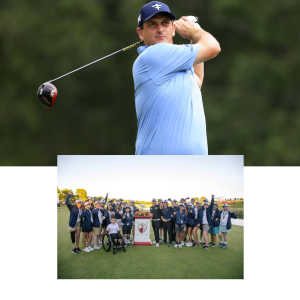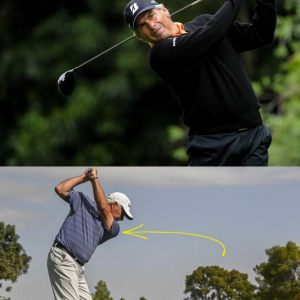South Korea has soared to become one of the golfiest nations on earth, rivaling even the U.S. Its residents’ almost viral infatuation with birdies and bogeys, however, is only half the story. Here, business, sponsorship and investment is booming.
It’s a rags-to-riches tale: South Korea, since its war against the north, has catapulted its way from being a very poor country to one of great wealth and prosperity. In fact, in 2022, its GDP hit $1.65 trillion, making it the 13th largest economy in the world. A chunk of that money has been funneled into the golf space.
South Korea–based companies have become some of the game’s most important corporate sponsors. Upscale auto manufacturer Genesis, a subsidy of Seoul-based Hyundai, sponsors two events on the calendar, including the Genesis Invitational, hosted by Tiger Woods, and the former Los Angeles Open, which has been a Tour stop since 1926. That early-season tune-up event is buttressed by July’s Scottish Open at Renaissance Club the week before the Open.
Genesis says golf is a reflection of its values (“respect, integrity and excellence”) but that sponsoring events goes well beyond just hitting a key demographic in countries around the world. It embodies the country’s corporate hospitality model for esteemed guests, referred to in Korean as Son-Nim, an honorific title for customers.
Earlier this year, another venerable PGA Tour stop, the Byron Nelson Classic, was rebranded as the CJ Cup Byron Nelson, reflecting Korean conglomerate CJ Group’s deep inroads to the sport, which began with its sponsorship of Se-Ri Pak in 2001. Yong Han, in CJ’s sport marketing division, says, “We started with Se-Ri and that was the company’s first international or global marketing campaign.”
The company realized, after supporting women golfers for so long, that it needed to help grow the men’s game as well. They started with sponsoring individual players before hosting the CJ Cup at Nine Bridges in 2017. “We’re trying to connect the Korean lifestyle and food within the tournament,” Han says. “So we’re bringing our flavors to a sports platform by providing the best food they can have at the golf tournament. We brought 14 chefs to the tournament last year to do player dining.” The tournament sponsorships are “there to amplify our marketing strategy but also to bring the lifestyle of fun, ease and an enjoyable atmosphere at the same time.”
The vibrant golf-simulator scene in Seoul is dominated by Golfzon, but another Korea-based sim manufacturer, Uneekor, is moving a lot of product in the States with both top-of-the-line sims and those most golfers can afford. Companies like Uneekor and others (along with a slew of investor support) have helped launch the Tiger Woods and Rory McIlroy TMRW Sport venture TGL, set to debut in January with Genesis as the league’s first founding partner. TGL, with its city-based club teams, will seek to replicate some of the Korean screen-golf competition. “Korean brands like Genesis already embrace our three pillar goals: incorporating technology, leveraging quality celebrities in the sport and providing a unique experience for the fan,” says Katy Mollica, head of global partnerships at TMRW Sport.
The premium South Korea-based ball manufacturer is Volvik, which is best known for its colorful matte finishes and long-time association with World Long Drive. This spring, TaylorMade Golf, based in Carlsbad, Calif., moved production of some its more popular and Tour models to a plant just a few hours south of Seoul. Private equity and real estate firm Centroid Investment Partners actually owns TaylorMade, having acquired the gear manufacturing giant in 2011. (Centroid also invests in TM staffer Tiger Woods’ Popstroke and Sun Day Red ventures.)
“TaylorMade believes that the Korean marketplace is ripe with potential for growth,” says David Abeles, CEO of the equipment company. “Korea is the third largest golf market in the world, and our business is strong there, but we felt, through an alliance with Korean investors, we can further enhance and grow our business in a meaningful way globally. And that certainly has happened.”
Twenty-three years ago, Titleist was brought under the umbrella of FILA Korea, though it is still owned and operated by the Acushnet company in Fairhaven, Mass. As late as this past July, rumors in business circles were swirling that yet another Korean firm was set up to acquire another one of America’s big five manufacturing giants.
The Pacific Basin, in general, represents two of the largest golf markets, Japan and South Korea, and penetrating both of these, from a business perspective, is really to penetrate the entire world. With golf’s continued popularity, it only makes sense that Korean companies are seeing big opportunities on the game’s biggest stages. They’re looking to make inroads into the larger American and European markets. Stay tuned.





